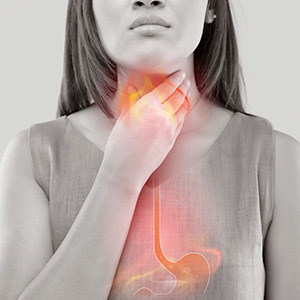Are you struggling with GERD or Gastro Esophageal Reflux Disease? Do heartburn and trouble swallowing food cause you daily distress? You are not alone. Millions of people around the world suffer from this digestive disorder which causes stomach acid to travel up your esophagus, resulting in painful and sometimes severe symptoms. But there is hope—in this blog post, we'll explore natural remedies, lifestyle changes, and other treatments that can provide relief from GERD. So keep reading to learn more about tackling this tricky condition once and for all!
What is GERD and How Can You Tell if You Have It
GERD, or gastroesophageal reflux disease, is an uncomfortable and potentially serious condition. Affecting the lining of the esophagus, GERD can cause burning sensations in the chest, known as heartburn as well as a sour-tasting regurgitation of acidic stomach contents into the mouth. Those suffering from GERD may experience heartburn more than twice each week, and it can interfere with their overall quality of life. Fortunately, there are effective ways to find relief from GERD and its causes by modifying lifestyle practices such as changing your diet, avoiding certain foods that increase acid production, losing extra weight, and practicing stress-reducing exercises. Additionally, talk to your doctor about medication options if necessary. With this combination of lifestyle changes and treatments, you can improve your symptoms and get lasting GERD relief.
The Dangers of Ignoring GERD Symptoms
Gastroesophageal reflux disease (GERD) can cause a range of uncomfortable symptoms, such as heartburn, chest pain, difficulty swallowing, and frequent burping. Many people try to ignore GERD symptoms instead of seeking out help with treatment. However, ignoring these signs can lead to potentially serious complications. Prolonged exposure to acid in the esophagus can cause permanent damage to the tissues and nerves that line the esophagus, which may lead to narrowing and even cancer in extreme cases. GERD relief causes should be determined as soon as possible to avoid any lasting damage. Medical treatments may include certain medications or lifestyle modifications; options should be discussed thoroughly with a healthcare provider for more information.
Eating Habits That Help Manage and Reduce GERD Symptoms
Eating habits can be both a positive and negative contributor to GERD relief. By making changes in diet and portion size, people with GERD can find relief from uncomfortable symptoms like heartburn and regurgitation. Smaller, more frequent meals help prevent the backflow of acid into the esophagus. In addition, it is important to limit the intake of foods that irritate the stomach, such as coffee, soda, alcohol, and spicy or fried dishes. Eating slowly and avoiding overeating are two critical changes in eating habits with the potential to trigger symptoms. Lastly, fat intake should be managed carefully when trying to reduce GERD impacts - consuming too much (or too little) can aggravate symptoms, so striking a balanced approach is best for many GERD sufferers who want optimal relief.
Medications for Treating and Controlling GERD
When it comes to treating and controlling Gastroesophageal Reflux Disease (GERD), medications can be a significant aid in providing relief and comfort. Depending on the severity of the symptoms, GERD patients may benefit from over-the-counter medications such as antacids, H-2 blockers, and Proton Pump Inhibitors (PPI). Antacids act quickly by neutralizing stomach acid, while H-2 blockers reduce the output of gastric acid. PPIs provide greater relief by blocking the production of stomach acid altogether. As with any medication, side effects and drug interactions need to be considered when selecting an appropriate treatment option for GERD relief causes. Working closely with healthcare professionals is essential in finding an effective remedy that not only brings much-needed comfort but also ensures safety while on treatment.
Natural Remedies to Relieve GERD Symptoms
GERD relief is often sought after due to its painful and unattractive symptoms, but many people don't realize that there are natural remedies for this condition! It's important to be aware of some of the causes that can trigger GERD, such as certain foods containing high fat or caffeine. Additionally, large meals and carbonated drinks can aggravate the issue as well. By knowing what your triggers are, you'll have a better chance at curbing your symptoms with natural remedies such as probiotics, moderate exercise, supplements containing zinc and magnesium citrate, or drinking various teas that have anti-inflammatory effects. Making lifestyle adjustments and understanding your triggers will help you achieve relief from the uncomfortable symptoms of GERD.
Lifestyle Changes to Help Manage and Prevent Future Flare-Ups of GERD
Managing and preventing future flare-ups of GERD can start with small lifestyle changes. A few GERD relief causes to consider include avoiding triggers, such as acidic or spicy foods, limiting alcohol, not smoking, and eating smaller, more frequent meals throughout the day instead of large meals all at once. Additionally, activating a regular exercise program has been shown to reduce stress and help relieve GERD symptoms by strengthening the lower esophageal sphincter—the muscle that helps keep stomach acid from entering the esophagus. Making healthy lifestyle choices doesn't guarantee a flare-up won't occur; however, it might provide the extra steps needed to assist in controlling occasional heartburn associated with GERD.

